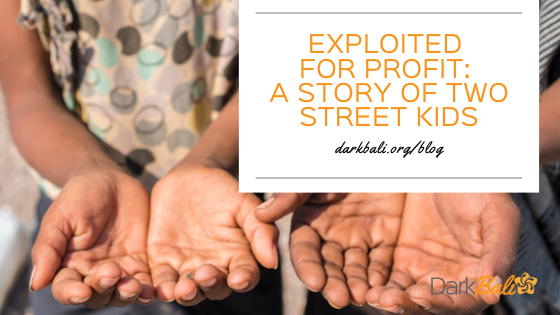There were two of them. One was probably around 7 and the other younger… maybe 4. They could have been sisters. They were both small and skinny, with tattered clothing and hungry eyes. I saw them as I was walking across the parking lot to the convenience store where I stopped to get a bottle of water on my way home. It was dark, but I could see both of the girls clearly because they were standing next to the door of the store in the light coming from the windows. They both had open palms and watched me intently as I walked toward them. I smiled at both of them, said hello, and went on inside.
The smile on my face didn’t match what I was feeling. I didn’t know these particular kids, but I was familiar with the stories of other street kids around Indonesia. Many of them had no real families or were sent by their families in village far away to beg on the streets in the tourist areas for money. They were not enrolled in school and many of them were physically ill and malnourished. Worst of all, I knew that most of the children involved in begging, selling, and street performing were being exploited by adults.
In line with best practices, I bought the girls milk along with my water and pushed straws into the containers ensuring that they could not be resold. I hoped that they would get something nutritious to fill their bellies for the evening. When I went back outside, I put a milk in each girl’s hand and told her that I hoped she would have a good night. It was not enough, but it there was nothing left to do. In Indonesia, there is no child protective services department to call to scoop these kids off the street and place them in a safe residential care.
Curious what the girls would do with their milk, I sat in my car and watched. Without taking a single sip, both girls walked to an expensive white SUV parked in a dark corner of the parking lot. I saw the driver’s window roll down, and a hand adorned with a fancy watch and jeweled rings took each milk and then point back to the convenience store. Dutifully, the girls went back to their spot by the door, palms up waiting for the next passerby. I sighed. It was as I had suspected.
This is only one small story of a couple of children, but they represent a larger group of children that remain virtually invisible to both tourists and Indonesian citizens on my island. They are runaways or children of exploited parents who are used as commodities. I knew it was very likely that their bodies were for sale as well if an interested buyer could be found.
Usually, street kids experience multiple forms of exploitation. Some children are given the task to sell trinkets or fruit and others perform dances on the streets for tourists for tips, but all of them have a handler controlling them and keeping the money that they’ve earned. Within these little gangs of children there is violence and psychological abuse, and in many cases, there is sexual exploitation. Some children sell themselves in exchange for food or housing (a form of child sex trafficking known as “survival sex”), and others are pimped out by others to pedophiles, both local and foreign, who realize that no one really cares what happens to a street child. These kids are the most powerless and vulnerable in society, and their lives are often snuffed out early through disease and violence. Those who do manage to make it to adulthood are generally trapped in the same exploitative cycles of poverty and violence, and their own children are a significant risk of the same.
I am thankful that there is a growing awareness of these children in Indonesia and that there are organizations opening up that are offering drop-in care, medical assistance, and education for kids like these girls. I am thankful that more and more people are recognizing how much more complex their abuse is than simple poverty that leads to begging. There is more to do so that eventually when we come across kids like this, we will be able to immediately respond and keep them away from that jeweled hand that was controlling them to the point that they were too scared to even drink a sip of milk.
(As an organization primarily focused on equipping those on the frontlines, we honor those who are committed to the groundbreaking work of victim identification. They are in the thick of some of the ugliest ways humans hurt one another. While these work to create new paths to retrieve victims from trafficking situations, we support them by providing training on important topics like trauma, victim identification, victim-centered interviewing, and secondary trauma. To partner with Dark Bali in order to serve all of our coalition partners, contact us or become a financial partner.)






